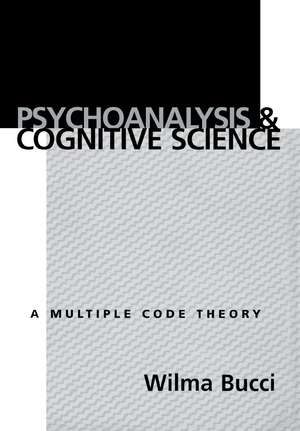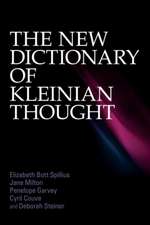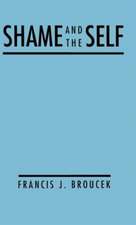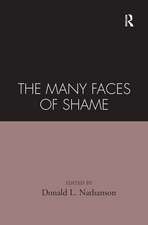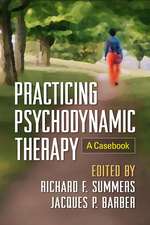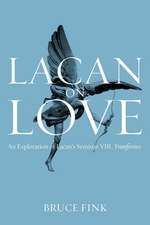Psychoanalysis and Cognitive Science: A Multiple Code Theory
Autor Wilma Buccien Limba Engleză Hardback – 2 iul 1997
Although psychoanalytic concepts underlie most forms of psychotherapy practiced today, the basic Freudian theory of mind the metapsychology does not mesh with current scientific views in psychology and related fields. As a result, despite its many strengths, psychoanalysis has been relegated to the periphery by clinicians and researchers alike. Filling a significant void, this book from cognitive scientist and psychoanalytic researcher Wilma Bucci proposes a new model of psychological organization that integrates psychoanalytic theory with the investigation of mental processes. Solidly rooted in current cognitive science, multiple code theory recognizes the focus on meanings and motives that is intrinsic to psychoanalytic clinical work. The theory points to parallel functions underlying free association and dreams, as well as conceptual development in children and creative work in sciences and the arts, and provides a strong foundation for empirical research on the psychoanalytic treatment process.
Preț: 429.21 lei
Nou
Puncte Express: 644
Preț estimativ în valută:
82.13€ • 85.75$ • 67.97£
82.13€ • 85.75$ • 67.97£
Carte tipărită la comandă
Livrare economică 05-19 aprilie
Preluare comenzi: 021 569.72.76
Specificații
ISBN-13: 9781572302136
ISBN-10: 1572302135
Pagini: 362
Dimensiuni: 152 x 229 x 33 mm
Greutate: 0.74 kg
Ediția:New.
Editura: Guilford Publications
Colecția Guilford Press
ISBN-10: 1572302135
Pagini: 362
Dimensiuni: 152 x 229 x 33 mm
Greutate: 0.74 kg
Ediția:New.
Editura: Guilford Publications
Colecția Guilford Press
Public țintă
Professional and Professional Practice & DevelopmentCuprins
Introduction: Bridging the Great Divide
I. Reconstruction of the Metapsychology: The Roots
1. Freud's Abstract Models of the Psychical Apparatus
2. The Metapsychology, the Clinical Theory, and the Psychoanalytic Method
3. The Role of Empirical Research
4. Networks of the Mind: Toward a Psychological Model for Psychoanalysis
II. Components of the Multiple Code Theory: Current Research
5. The Architecture of Cognition: Symbolic and Subsymbolic Processing
6. Multiplicity of Systems: Evidence from the Functional Approach
7. Functional Distinctions in Specific Sensory Systems
8. Emotion and Cognition: A New Integration
9. The Infant's Cognitive and Emotional World
10. Multiple Coding on the Neurophysiological Level: Lateralization and Modularity of Function
III. The Multiple Code Theory and the Referential Cycle
11. Basic Concepts of the Multiple Code Theory
12. The Emotion Schemas and their Vicissitudes
13. Linking Feelings and Words: The Referential Cycle
14. The Referential Cycle in Free Association
15. The Referential Cycle in Fantasies and Dreams
16. The Multiple Code Theory and the Metapsychology
17. Empirical Studies of the Analytic Process
18. Notes Concerning the Psychoanalytic Research Agenda
LAST WORDS: 1. The Tower of Babel 2. The Dead Man's Tale
I. Reconstruction of the Metapsychology: The Roots
1. Freud's Abstract Models of the Psychical Apparatus
2. The Metapsychology, the Clinical Theory, and the Psychoanalytic Method
3. The Role of Empirical Research
4. Networks of the Mind: Toward a Psychological Model for Psychoanalysis
II. Components of the Multiple Code Theory: Current Research
5. The Architecture of Cognition: Symbolic and Subsymbolic Processing
6. Multiplicity of Systems: Evidence from the Functional Approach
7. Functional Distinctions in Specific Sensory Systems
8. Emotion and Cognition: A New Integration
9. The Infant's Cognitive and Emotional World
10. Multiple Coding on the Neurophysiological Level: Lateralization and Modularity of Function
III. The Multiple Code Theory and the Referential Cycle
11. Basic Concepts of the Multiple Code Theory
12. The Emotion Schemas and their Vicissitudes
13. Linking Feelings and Words: The Referential Cycle
14. The Referential Cycle in Free Association
15. The Referential Cycle in Fantasies and Dreams
16. The Multiple Code Theory and the Metapsychology
17. Empirical Studies of the Analytic Process
18. Notes Concerning the Psychoanalytic Research Agenda
LAST WORDS: 1. The Tower of Babel 2. The Dead Man's Tale
Notă biografică
Wilma Bucci did her graduate training in clinical and cognitive psychology and psycholinguistics at the University of Michigan and New York University; then joined the faculty of the Psychiatry Department of the SUNY Downstate Health Sciences Center as a clinical researcher. Since 1983, she has been on the faculty of the Derner Institute, the doctoral clinical psychology program of Adelphi University, where she is now Professor and Director of Research. She is also Vice-President and Scientific Co-Director of the Glass Institute of Basic Psychoanalytic Research, and is on the faculty of the International Psychoanalytical Association Research Training Programme.
She and her husband, Bernard Maskit, who is a mathematician, share five children, with extended family, all of whom have opinions on the issues covered in this book.
edited version:
Wilma Bucci, PhD, is Professor and Director of Research at the Derner Institute, the doctoral clinical psychology program of Adelphi University. Vice-President and Scientific Co-Director of the Glass Institute of Basic Psychoanalytic Research, she is also on the faculty of the International Psychoanalytical Association Research Training Programme. Dr. Bucci completed her graduate training in clinical and cognitive psychology and psycholinguistics at the University of Michigan and New York University.
She and her husband, Bernard Maskit, who is a mathematician, share five children, with extended family, all of whom have opinions on the issues covered in this book.
edited version:
Wilma Bucci, PhD, is Professor and Director of Research at the Derner Institute, the doctoral clinical psychology program of Adelphi University. Vice-President and Scientific Co-Director of the Glass Institute of Basic Psychoanalytic Research, she is also on the faculty of the International Psychoanalytical Association Research Training Programme. Dr. Bucci completed her graduate training in clinical and cognitive psychology and psycholinguistics at the University of Michigan and New York University.
Recenzii
For many years Dr. Wilma Bucci has been engaged in critical research on the psychoanalytic process and has developed her multiple code theory. Her new book, Psychoanalysis and Cognitive Science: A Multiple Code Theory, is, in many ways, a culmination of her long years of empirical and theoretical work. It is a remarkable book that succeeds in linking psychoanalytic theory both to the world of cognitive science and to empirical research on psychoanalytic treatment. It seems to me that the future of psychoanalysis lies in its openness to empirical work and to concepts and developments in other disciplines. There are few books that, at one and the same time, remain faithful to the concrete realities of psychoanalysis and are able to integrate it into the larger world of theories of mind. This is such a book. For anyone interested in psychoanalysis, this book is a 'must read.' --Morris Eagle, PhD, Professor of Psychology, Derner Institute of Advanced Psychological Studies, Adelphi University; Past-President, Division of Psychology, American Psychological Association
Wilma Bucci provides a thoughtful synthesis of two fields that have traditionally ignored one another. Broad in scope, Psychoanalysis and Cognitive Science explores many exciting intersections between clinical and experimental approaches. This well-written, often provocative book should provide a foundation for productive and long overdue exchanges between clinicians and cognitive scientists. --Daniel L. Schacter, PhD, Professor and Chair of Psychology, Harvard University, and author of Searching for Memory: The Brain, The Mind, and The Past.
-Wilma Bucci provides a thoughtful synthesis of two fields that have traditionally ignored one another. Broad in scope, Psychoanalysis and Cognitive Science explores many exciting intersections between clinical and experimental approaches. This well-written, often provocative book should provide a foundation for productive and long overdue exchanges between clinicians and cognitive scientists. --Daniel L. Schacter, PhD, Professor and Chair of Psychology, Harvard University, and author of Searching for Memory: The Brain, The Mind, and The Past.
This volume is cogent, informed, and clearly written. It is a powerful antidote to the prevalent skepticism regarding the possibility of establishing psychoanalytic theory upon a scientific model of the mind.
--The Psychoanalytic Quarterly, 5/18/1997Descriere
This work offers a multiple code theory for psychoanalysis and cognitive science and explores the factors dividing the two. It reviews the historical role of theory in psychoanalysis and introduces current work in cognitive psychology.
